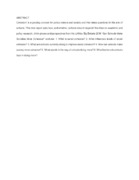| dc.contributor.author | Njoka, Johannes Njagi | |
| dc.contributor.author | Githui, Perminus | |
| dc.date.accessioned | 2023-12-13T07:32:27Z | |
| dc.date.available | 2023-12-13T07:32:27Z | |
| dc.date.issued | 2023 | |
| dc.identifier.citation | The Journal of Frontiers in Humanities and Social Sciences | en_US |
| dc.identifier.uri | https://orcid.org/0000-0001-8667-9015 | |
| dc.identifier.uri | https://karuspace.karu.ac.ke/handle/20.500.12092/3021 | |
| dc.description | Schools and cohesiveness | en_US |
| dc.description.abstract | Cohesion’ is a growing concern for policy makers and society and this raises questions for the role of schools. This mini-report asks how, and whether, schools should respond. We draw on academic and policy research, think-pieces and perspectives from the LKMco Big Debate 2016 ‘Can Schools Make Societies More Cohesive?’ and ask: 1. What is social cohesion? 2. What influences levels of social cohesion? 3. What are schools currently doing to improve social cohesion? 4. How can schools make society more cohesive? 5. What stands in the way of schools doing more? 6. What barriers do schools face in doing more? | en_US |
| dc.language.iso | en | en_US |
| dc.subject | Agents of socialization | en_US |
| dc.subject | curriculum | en_US |
| dc.subject | fundamentals of cohesion | en_US |
| dc.subject | nationhood | en_US |
| dc.subject | patriotism | en_US |
| dc.title | Can Schools Make Our Society More Cohesive? A Case of Public Secondary Schools in Embu and Nairobi Counties, Kenya | en_US |
| dc.type | Article | en_US |
